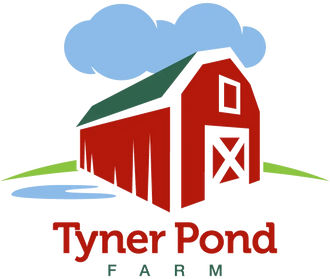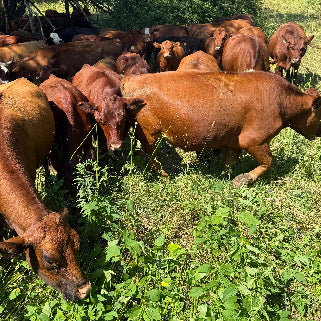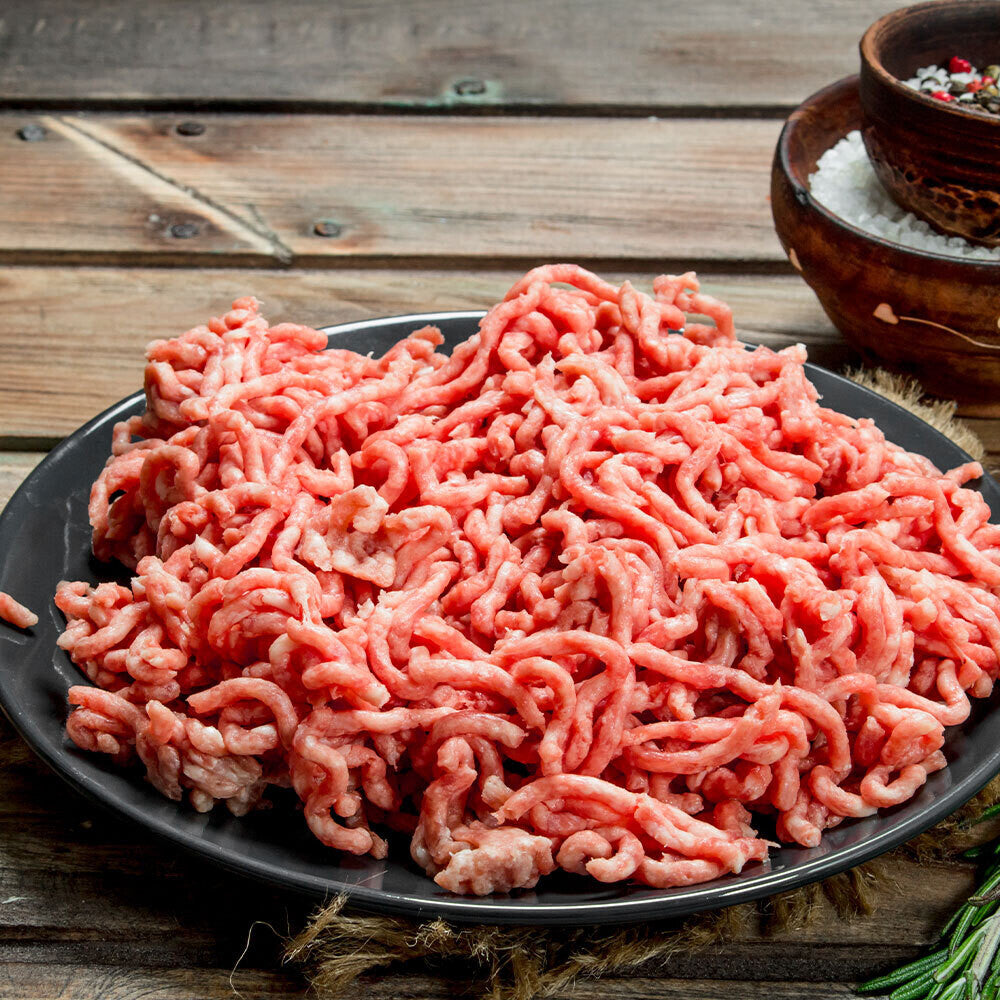
Pork with a Difference: Tyner Pond and Gunthrop Farms Join Forces
Exciting news for Tyner Pond Farm! We are proud to have teamed up with Gunthorp Farms, another name you might recognize in Indiana for a commitment to sustainable farming. Our friend Greg Gunthrop and his family have been raising pigs outdoors since the late 90's. Every pig raised at Gunthorp Farms is born on their land, which means no outside genetics come into the mix. They even have their own processing plant right on the farm.
This partnership means a lot to us. Two farms, both committed to doing things the right way, working together.
 Forest Raised Pigs
Raising pigs in woods and pastures as opposed to industrial confinement systems offers a variety of benefits, both for the animals and the end consumers:
[fusion_youtube id="https://youtu.be/slzdX-4ZZVI" alignment="center" width="" height="" autoplay="false" mute="false" api_params="" title_attribute="" video_facade="" margin_top="" margin_bottom="" hide_on_mobile="small-visibility,medium-visibility,large-visibility" class="" css_id="" structured_data="off" video_upload_date="" video_duration="" video_title="" video_desc=""][/fusion_youtube]
Forest Raised Pigs
Raising pigs in woods and pastures as opposed to industrial confinement systems offers a variety of benefits, both for the animals and the end consumers:
[fusion_youtube id="https://youtu.be/slzdX-4ZZVI" alignment="center" width="" height="" autoplay="false" mute="false" api_params="" title_attribute="" video_facade="" margin_top="" margin_bottom="" hide_on_mobile="small-visibility,medium-visibility,large-visibility" class="" css_id="" structured_data="off" video_upload_date="" video_duration="" video_title="" video_desc=""][/fusion_youtube]
 Happy Mom and Baby Pigs
Happy Mom and Baby Pigs
 Pigs Raised In Confinement
In confinement hog farms (often referred to as "factory farms" or "CAFO's"), various drugs, including antibiotics and growth promoters, are sometimes used to enhance growth and prevent or treat diseases that can become prevalent in crowded conditions.
Pigs Raised In Confinement
In confinement hog farms (often referred to as "factory farms" or "CAFO's"), various drugs, including antibiotics and growth promoters, are sometimes used to enhance growth and prevent or treat diseases that can become prevalent in crowded conditions.
 Sow and baby pigs
Sow and baby pigs
 Forest Raised Pigs
Raising pigs in woods and pastures as opposed to industrial confinement systems offers a variety of benefits, both for the animals and the end consumers:
[fusion_youtube id="https://youtu.be/slzdX-4ZZVI" alignment="center" width="" height="" autoplay="false" mute="false" api_params="" title_attribute="" video_facade="" margin_top="" margin_bottom="" hide_on_mobile="small-visibility,medium-visibility,large-visibility" class="" css_id="" structured_data="off" video_upload_date="" video_duration="" video_title="" video_desc=""][/fusion_youtube]
Forest Raised Pigs
Raising pigs in woods and pastures as opposed to industrial confinement systems offers a variety of benefits, both for the animals and the end consumers:
[fusion_youtube id="https://youtu.be/slzdX-4ZZVI" alignment="center" width="" height="" autoplay="false" mute="false" api_params="" title_attribute="" video_facade="" margin_top="" margin_bottom="" hide_on_mobile="small-visibility,medium-visibility,large-visibility" class="" css_id="" structured_data="off" video_upload_date="" video_duration="" video_title="" video_desc=""][/fusion_youtube]
Outdoor Environmental Benefits:
- Reduced Environmental Impact: Pigs raised on pasture help aerate the soil with their rooting behavior, which can improve soil health. Additionally, their manure is spread out naturally, enriching the soil without the concentrated waste issues found in confinement systems.
- Promotes Biodiversity: Pastured systems, especially when combined with wooded areas, support a variety of flora and fauna. Pigs can help control certain pests and invasive plants by eating them, reducing the need for chemical treatments.
Outdoor Animal Welfare Benefits:
- Natural Behaviors: Pigs on pasture or in woods can exhibit natural behaviors like rooting, wallowing, and foraging. This leads to happier, less stressed animals.
- Space and Fresh Air: Pigs raised outside have more space to move around, reducing the risk of injuries and diseases that can be prevalent in crowded confinement systems.
 Happy Mom and Baby Pigs
Happy Mom and Baby Pigs
Outdoor Health and Nutritional Benefits:
- Improved Pork Quality: Many advocates claim that pastured pork has a richer flavor due to the varied diet pigs consume.
- Better Nutrient Profile: Some studies suggest that pastured pork may have a better fatty acid profile, with higher levels of omega-3 fatty acids compared to conventionally raised pork.
- No Antibiotics: As pastured pigs are less stressed and are not in close confinement, there's no need for antibiotics which are used in industrial systems to prevent the spread of disease.
No Growth Enhancers:
 Pigs Raised In Confinement
In confinement hog farms (often referred to as "factory farms" or "CAFO's"), various drugs, including antibiotics and growth promoters, are sometimes used to enhance growth and prevent or treat diseases that can become prevalent in crowded conditions.
Pigs Raised In Confinement
In confinement hog farms (often referred to as "factory farms" or "CAFO's"), various drugs, including antibiotics and growth promoters, are sometimes used to enhance growth and prevent or treat diseases that can become prevalent in crowded conditions.
Outdoor Economic and Social Benefits:
- Supports Local Economies: Small-scale pastured pig farming can provide local employment opportunities and support local economies. Gunthrop Farms employs 17 people!
- Resilient Farming Systems: Diversified farming systems, like combining woodlot and pasture-raised pigs with other farming activities, can help farmers manage risks better and provide multiple income streams.
 Sow and baby pigs
Sow and baby pigs
Outdoor Ethical Considerations:
- Ethical Meat Production: Many consumers are increasingly concerned about the ethics of meat production. Raising pigs in natural environments addresses some of these concerns, as it's seen as a more humane method.
Previous post
TPF Return Policy
Next post
















